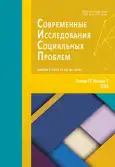«Eternal» themes and their transformation in perestroika-era fiction story Avariya by Y. M. Korotkov
- Autores: Zhupikov V.S.1, Provatorova O.N.1
-
Afiliações:
- Orenburg State University
- Edição: Volume 17, Nº 2 (2025)
- Páginas: 10-37
- Seção: Language and Literature Studies
- ##submission.datePublished##: 30.06.2025
- URL: https://bakhtiniada.ru/2077-1770/article/view/305511
- DOI: https://doi.org/10.12731/2077-1770-2025-17-2-477
- EDN: https://elibrary.ru/WMDWWZ
- ID: 305511
Citar
Texto integral
Resumo
Background. A question of «eternal» themes in literary science is significant. Throughout the existence of mankind, number of certain themes remains inexhaustible, passing from one time period to other one, from book to book. That is why it is interesting to see, how «eternal» themes develop in the literary process, including in modern one. Fiction texts of perestroika-period are little studied in the science, which is why we addressed to the book of this epoch. All the above makes the relevance of our research.
The purpose of this article is to investigate the realization of «eternal» themes in the fiction story Avariya by Y.M. Korotkov, identifying their specific in the text of perestroika-epoch.
Materials and methods. In this work the method of analysis and synthesis of theoretical information was applied to understand the essential characteristics of the theme as a literary category for further researching «eternal» themes in the fiction story Avariya (their transformation on the example of text of perestroika-epoch), produced by textual analysis.
Results. We identified «eternal» themes in the fiction story Avariya and analyzed their transformation, which was due to the specific of historical period, that allowed us to come to following results. The theme of relations of «fathers» and «children», the theme of feelings and the theme of the prodigal son are also reflected in the literary creativity, and the perestroika-epoch puts an imprint on their realization. The conflict of «fathers» and «children» is reflected in the text both at the family level and out-of-family level, the change of epoch and ideology plays a huge role in their disputes. The theme of feelings, considered by us as eternal, was realized in the destructive aspect, the distortion of the notion of true feelings was revealed, which is due to the perestroika-epoch pathos of this fiction story; it is in what we see the specificity of the realization of the theme of feelings (as eternal one) in the perestroika text. The theme of prodigal son, realized in the fiction story in the image of prodigal daughter, is revealed by the motif of crime and punishment: it shows how the life’s path of the character led her to a tragic outcome; the evangelical’s plot about the prodigal son differs from the spot of researching fiction story, the author introduces perestroika’s context of the realization of the theme. All the above makes it possible to say that «eternal» themes are strongly raised in the texts of modern literary process, and the epoch’s sentiments affects their development.
Sobre autores
Vadim Zhupikov
Orenburg State University
Autor responsável pela correspondência
Email: vzp01@mail.ru
student
Rússia, 13, Pobedy prospekt, Orenburg, 460018, Russian Federation
Olga Provatorova
Orenburg State University
Email: olgaprovatorova@mail.ru
ORCID ID: 0009-0006-2251-7109
PhD in Philology, Associate Professor, Associate Professor of Department of Russian Philology and Methods of Teaching Russian Language
Rússia, 13, Pobedy prospekt, Orenburg, 460018, Russian Federation
Bibliografia
- Bedrikova, M. L. (2003). On "eternal themes" in Russian prose of the late 20th century. Problems of History, Philology, Culture, (13), 487–491. EDN: https://elibrary.ru/IAAYYD
- Korotkov, Yu. (1991). Accident: Stories. Petrozavodsk: Karelia. 336 p.
- Literary Encyclopedia: Dictionary of Literary Terms: In 2 vols. (Vol. 2) (Edited by N. Brodsky et al.). (1925). Moscow; Leningrad: L. D. Frankel Publishing House. 1198 columns. Retrieved from https://feb-web.ru/feb/slt/abc/0.htm (Accessed: November 14, 2025)
- Literary Encyclopedia of Terms and Concepts (Edited by A. N. Nikolyukin). (2001). Institute of Scientific Information on Social Sciences of the Russian Academy of Sciences. Moscow: NPK "Intelvak". 1600 columns.
- Literary and Encyclopedic Dictionary (Edited by V. M. Kozhevnikov, P. A. Nikolaev). (1987). Editorial Board: L. G. Andreev, N. I. Balashov, A. G. Bocharov et al. Moscow: Soviet Encyclopedia. 751 p.
- Rad', E. A. (2014). The history of the "prodigal son" in Russian literature: modifications of the archetypal plot in the movement of epochs (Abstract of doctoral thesis). Saratov. 45 p. EDN: https://elibrary.ru/WQCJKP
- Ranenko, M. B. (2022). Mass literature as a social phenomenon. Bulletin of the Moscow State Linguistic University. Humanities, (6(861)), 151–156. https://doi.org/10.52070/2542-2197_2022_6_861_151 EDN: https://elibrary.ru/SUAOYU
- Dictionary of Literary Terms (Edited by L. I. Timofeev, S. V. Turaev). (1974). Moscow: Prosveshchenie. 509 p.
- Tomashevsky, B. (1925). Theory of Literature. Leningrad: State Publishing House "Leningrad". 238 p.
- Timofeev, L. I. (1971). Fundamentals of Literary Theory. Textbook for students of pedagogical institutes (4th ed., revised). Moscow: Prosveshchenie. 461 p.
- Khamidova, N. D. (2022). Features of the literary process of the perestroika era. Talqin va tadqiqotlar ilmiy-uslubiy jurnali, (5), 139–145.
Arquivos suplementares










